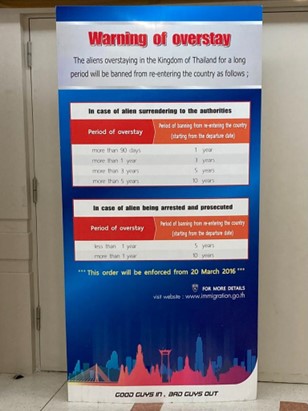So you’ve made your way into Thailand, legally, and you figure you’re all squared away with the immigration authorities. Well, maybe not. While the vast majority of short-term visitors enter and leave the kingdom without incident or concern, its ironically the case that foreigners who have taken the time and effort to obtain more complicated visas allowing for longer term stays, in whatever form, are the ones who typically fall afoul of the rules and regulations at some point. The three main issues that most expatriates here have a problem with at one time involve either an overstay, their re-entry, or their residence reporting. Here are some things to keep in mind.
No matter how long you’re here, and regardless of the form of visa you happen to be holding, one thing you should never do is overstay your welcome. Meaning pay close attention to how long you’re allowed to stay, and be sure to either extend or renew the permission if it looks like you’ll be staying beyond then. You may have heard backpacker tales from years ago when “things were different” that travelers came and went to and from Thailand seemingly at will, whenever and for however long they felt like doing so, because “nobody cared”. Well, those days are well and truly gone; overstaying your visa is now taken rather more seriously and the penalties can be significant.
Whether you’re here as a 30-day tourist, a locally employed executive, or a retiree, each day that you overstay your visa carries a THB 500 fine along with it. And that’s assuming you acknowledge the overstay yourself, voluntarily, rather than having it noticed by the authorities for whatever reason in their ordinary course of operations. In most cases, you just calculate the total amount due and pay it on the spot and that’s the extent of it. You still have to leave Thailand at that point, or somehow renew or extend the visa (if you’re allowed to), but you won’t get into any further trouble. But if it’s the case that you’ve overstayed by welcome by more than ninety days, you may also be prohibited from re-entering Thailand for up to ten years. It’s even worse if the government authorities somehow find out about it before you tell them.
Another concern often overlooked by long-term residents here is Thailand’s requirement for a re-entry stamp as a condition of coming and going into and out of the country while your visa remains valid. While short-term visitors by definition receive only single-entry permission, its certainly possible for people who are here to work or play for longer periods of time to come and go freely whenever they choose. But you darn well better not forget to get a re-entry stamp before you leave Thailand, or else all bets are off. For whatever reason (the cynics among us can imagine a few), re-entry stamps are separate and different permissions extended by the same government authorities, but at different desks and areas of administration, at an additional cost ranging from between 1,000 to 3,800 baht depending on whether you want a single or multiple re-entry stamp.
While not widely known, failure to obtain a re-entry stamp invalidates the visa at the point of departure from Thailand. Executives flying off for business lunches in Phnom Penh, or to Hong Kong for the weekend, are well advised to make sure they’ve squared this away before getting on the plane; I’ve witnessed too many fits of screaming at the airport to counsel otherwise. You’ll usually always be allowed back in, on the spot, but with a new single-entry tourist visa good for thirty days. That gives you just enough time to scramble around locally to find any professional help you might need, re-assemble all of your documentation, and save up however much money you’ll need for a new visa. This happens to a lot of people in Thailand, every single day, so it’s another one to be aware of.
Finally, if you just want to ride out your days here and never leave the country again, and simply hide out and be left alone, for heaven’s sake be sure to tell the government every ninety days where it is, exactly, that you can be found. Any foreigner staying in Thailand temporarily must report their home address to the Immigration Bureau quarterly, by means of a particular notification form. The reporting must be undertaken no less than fifteen days before, nor more than seven days after, the “due date” to be considered on time. It’s a fairly straightforward procedure and there’s no cost involved. It can even be done online, and many landlords will do it for their tenants as a matter of course. But at some point or another and particularly the longer you’re here, unless you take the time to organize yourself properly, you can easily overlook it and find yourself gritting through your teeth at the immigration requirements here yet again. Failure to report your address on a timely basis carries a fine of up to 5,000 baht (though its usually less) each time and, in theory at least, could result in being arrested.
Why do things seem so complicated and difficult here? While reasonable people may disagree over why these rules are in place and enforced so zealously nowadays, the sheer number of foreign visa holders in Thailand at any given moment and the aforementioned penalties for what can often be an inadvertent oversight or omission, or sheer ignorance of the rules to begin with, are certainly cause for speculation. Regardless of the why, many expatriates focus instead on the how and recruit professional service providers to calendarize and implement all of this for them.
(c) 2023 Frank Rittman




